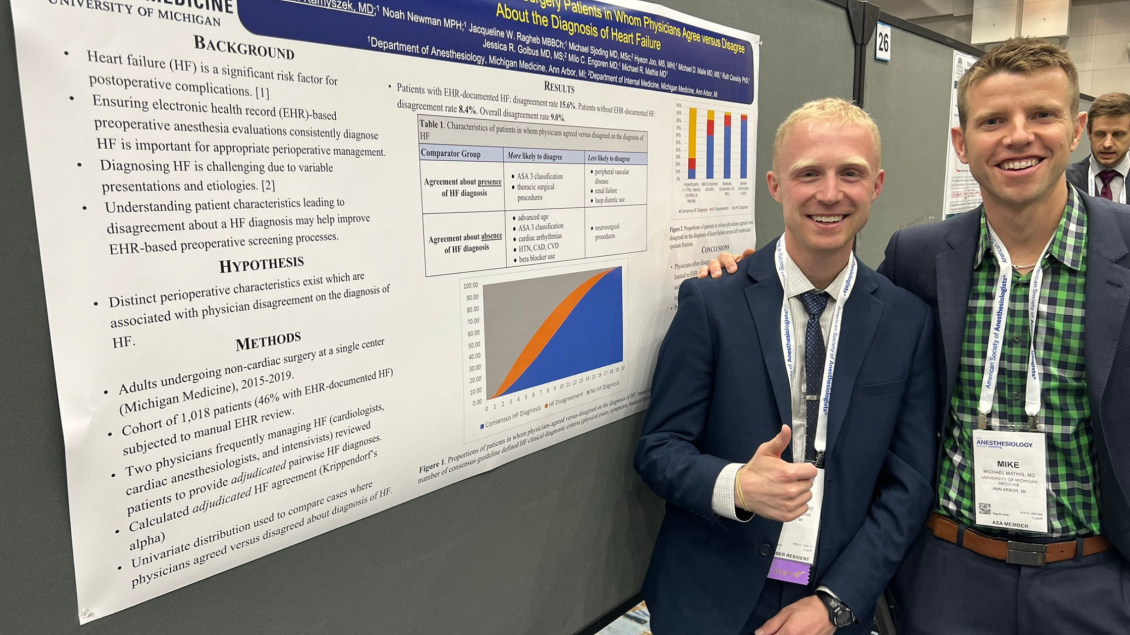-
Medical Student Programs -
Residency -
Fellowships -
Simulation Education -
Student Registered Nurse Anesthetist -
Other Learners -
MOCA -
Facilities & Spaces

The mission of our Clinician-Scientist Translational Anesthesiology Research (C-STAR) program is to help prepare residents for a future career in academic anesthesiology by establishing a foundation for outstanding translation research in the fields of perioperative medicine, pain medicine and critical care.
Involvement in the C-STAR program is contingent upon clinical excellence demonstrated throughout the CA-1 year. Resident applicants are encouraged to identify interest in the C-STAR program early in their training in order to meet with research mentors, enter into the application process and complete a research plan while clinical excellence is being established. However, House Officer candidates will be assigned, based on their research interests, to a research mentor from the beginning of the CBY year.
Research mentors are chosen through a process that includes the candidate. Mentors come from the T-32 program, which may also facilitate transition to the C-STAR program upon graduation from residency. Mentors are responsible for mentorship and assessment of research milestones. A list of mentors and their respective biographies can be downloaded, below.
Across the CA-2 and CA-3 years, the C-STAR resident will have six guaranteed months with call responsibility to accomplish their research plan. Continued call responsibility is considered important for development as a clinical anesthesiologist. Due to the diversity of research opportunities, the specifics of when these months are allocated will be decided on an individual basis.
Michigan Anesthesiology has a flexible resident research track, a post-residency NIH T32 program that was recently renewed, and a robust junior faculty career development program.
Between 2011 and 2017, three Michigan faculty received the American Society of Anesthesiologists Presidential Scholar Award, given to the most outstanding junior academic anesthesiologist in the country. Since then, our first T32 fellowship graduates now have NIH K funding (K08, K23) and multiple junior faculty currently have FAER awards. We also have a documented track record of mentorship up to the level of R-series funding for both MDs and PhDs.
Michigan Anesthesiology is currently #1 in NIH funding. Even excluding the large NIH grant that supports the institution’s translational science institute (the first and only awarded to an anesthesiologist), Michigan Anesthesiology would still be in the top 3 of NIH funding. Furthermore, in the last fiscal year we have been awarded more than $10M in state, foundation, and industry funding, leading to a robust and balanced portfolio that creates a secure ecosystem for junior faculty, who are engaged in most of these grants.
In addition to a highly developed and diverse external funding portfolio, Michigan Anesthesiology has a substantial and accessible endowment that supports innovative research across the translational spectrum as well as junior faculty who are launching their career.
Michigan Anesthesiology transcends the traditional scientific boundaries of the field. Our anesthesiologists currently serve as research deans, institute directors, center directors, and initiative leaders that span genomics, precision health, neuroscience, translational science, drug repurposing, psychedelic neuroscience, and research IT.
We are both researchers and research leaders, not only across the medical school but across the university. Our collaborations are richly multidisciplinary and have even extended to the arts. This extensive connectivity enables residents and junior faculty to easily access a major scholarly network that, at $1.7B annual expenditures, is among the most active research institutions in the country. At the national level, our anesthesiologists play roles in major foundations and journals dedicated to academic anesthesiology as well as NIH study sections and committees.
The University of Michigan has approximately 100 academic programs ranked in the top 10 of their field. Unlike a number of highly reputable academic medical centers, these programs are accessible on a contiguous campus in Ann Arbor, creating ease of access to exceptional talent across 19 schools and colleges. Michigan is home to nationally renowned research centers such as the Institute for Healthcare Policy & Innovation, Institute for Social Research, and more.
Even while pursuing basic science in our supportive environment, investigators can explore translational and clinical questions through the largest perioperative database in the world (Multicenter Perioperative Outcomes Group, founded and led by Michigan Anesthesiology). Being a faculty in our department allows access to pursue major observational research, with world-class expertise, to enhance the clinical impact of your investigation.
At Michigan Anesthesiology, we do not just care about what we do in research but how we relate to one another while doing it. Our culture, both departmentally and institutionally, is committed to collegiality, inclusivity, and collaboration.
At Michigan Anesthesiology, we have evolved beyond the traditional conception of the physician-scientist as the individual “doer” of research to a model in which we are team science leaders. We believe this enhances the potential for addressing more complex questions and creating bigger impact. Furthermore, we believe that the future of academic anesthesiology depends on anesthesiologist-researchers with high-level leadership skills. We therefore hope to develop outstanding clinician-scientists who can become future chairs, deans, and center directors.
Many academic anesthesiologists work in departments where basic science is poorly supported or marginalized. Part of this derives from leadership that does not value, understand, or prioritize foundational science.
The chair at Michigan Anesthesiology leads a robust, NIH-funded basic science program, enabling direct experience and appreciation at the highest departmental level of the opportunities and challenges associated with laboratory research. This translates to a supportive culture for emerging physician-scientists exploring foundational questions.
We seek to be the pre-eminent academic anesthesiology department in the world by making major advances in the field and developing the next generation of outstanding researchers.